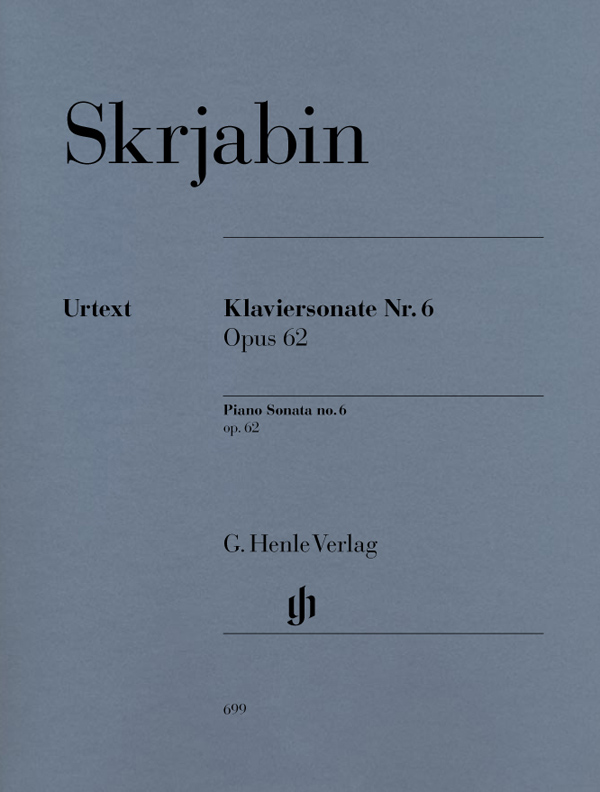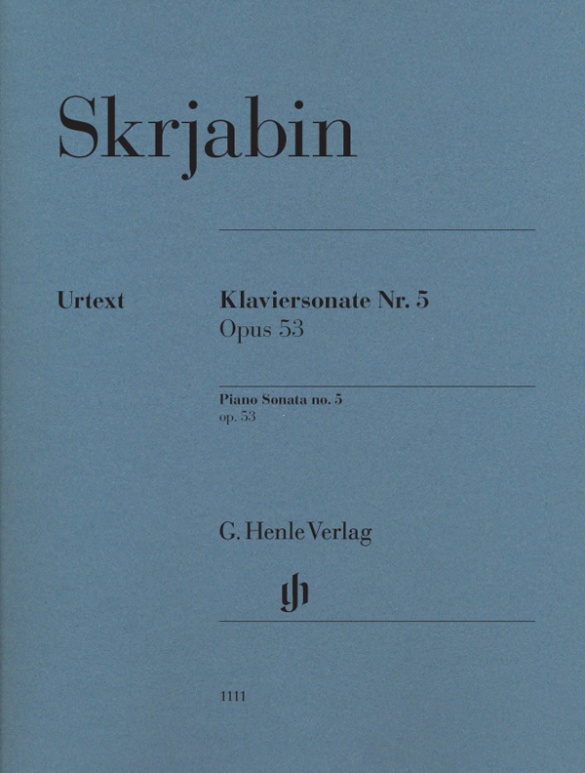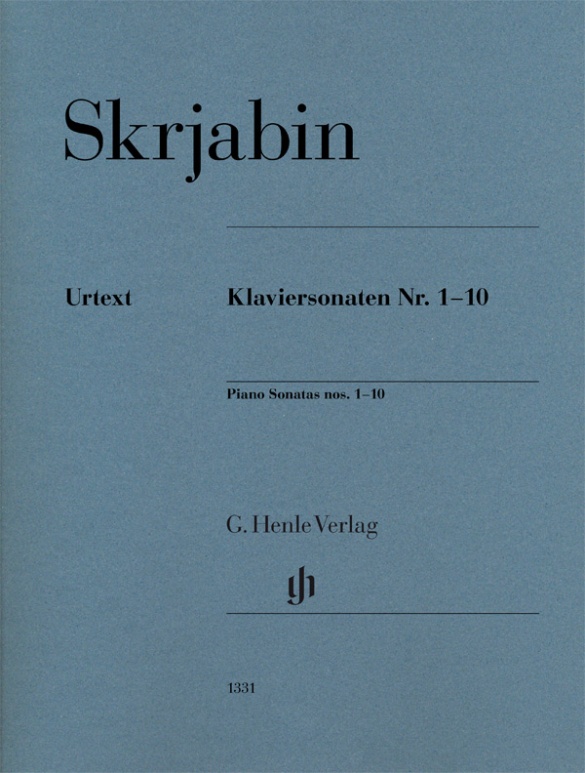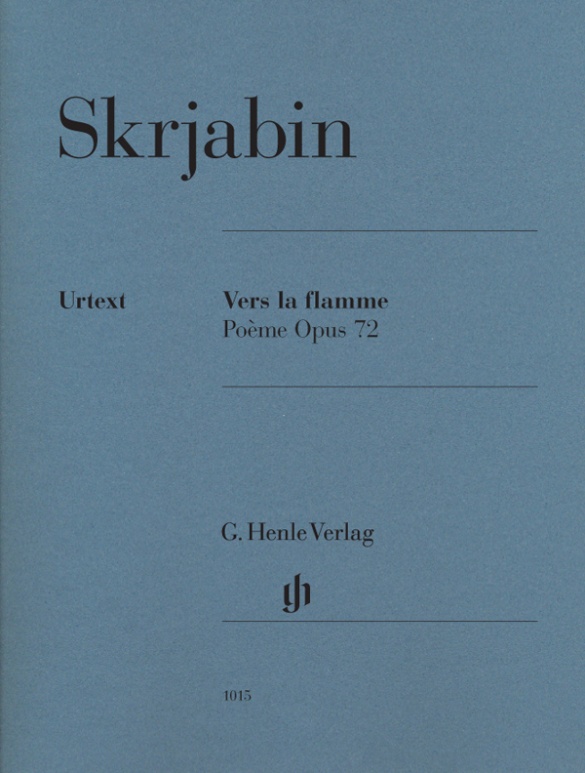

Alexander Scriabin
Vers la flamme, Poème op. 72
Scriabin’s ideal of music as part of a synthesis of the arts, raising people to a higher level of consciousness, is particularly apparent in his late work "Vers la flamme" op. 72. The poème opens with static, rough chords, and then slowly but steadily rises from the depths to the bright light above.
Diverse levels of sound in changing rhythms gradually move above one another and create a suction-like tension. At the close, tremolos and fanfares tower up to a blazing conflagration of orchestral intensity.
The Scriabin expert Valentina Rubcova knowledgeably sheds light on this suggestive work in the accompanying texts to our Urtext edition.
Content/Details
About the Composer
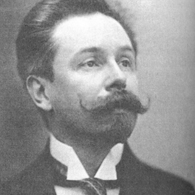
Alexander Skrjabin
Russian composer and pianist. The focal point of his oeuvre is his extremely unique piano music; in addition, he wrote important orchestral works.
| 1872 | Born in Moscow on January 6, the son of a pianist (his mother); she died in 1872. |
| 1888–92 | Piano studies at the Moscow Conservatory |
| 1888–96 | Twenty-four Preludes, Op. 11, containing all the hallmarks of Scriabin’s early period: broad, ornamental cantilenas underpinned by figurations and arpeggios in the style of Chopin, complex rhythmic structure from polyrhythms and syncopations. |
| 1892–1913 | Composition of ten piano sonatas. |
| 1896 | Travels to Paris, Vienna, Rome. |
| 1897 | Piano Concerto in F-sharp minor, Op. 20, in the style of Chopin. |
| 1897–1909/10 | He primarily composes orchestral pieces, including the major works “Le Poème de l’extase” (“The Poem of Ecstasy”) for large orchestra (1905–07), Op. 54, and “Prométhée ou Le Poème du feu” (“Prometheus or The Poem of Fire,” 1908–10); orientation toward Liszt and Wagner; programmatic music with occasional annotations in the musical score, incorporation of philosophical notions into his compositions, which are defined by various philosophical movements from around the turn of the century. Unusual intervals, harmonically at the edge of tonality. |
| 1899–1904 | Composition of his three symphonies, Opp. 26, 29, and 43. |
| 1904 | He resides in Switzerland. |
| 1906 | Invitation to the United States. |
| 1910 | Return to Russia. |
| 1908–10 | “Prométhée ou Le Poème du feu” for piano, orchestra, organ, choir, and clavier à lumière, Op. 60: enrichment of musical performance through plays of light. 1911–14, piano compositions, Opp. 61–74, with avant-garde harmonies. |
| 1913 | Beginning of the multisensory “Acte préalable” (“Prefatory Action”), which is never completed. |
| 1915 | Death in Moscow on April 27. |
About the Authors
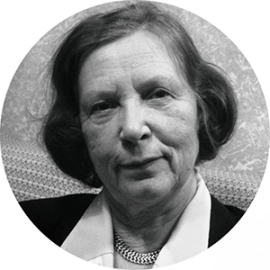
Valentina Rubcova (Editor)
Valentina Rubcova holds a doctorate in musicology, is editor-in-chief of the Moscow music publishing house “Muzyka – P. Jurgenson Publishing House” and deputy head of research at the Scriabin Memorial Museum Moscow.
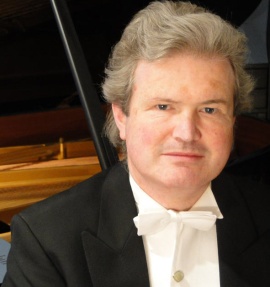
Michael Schneidt (Fingering)
Michael Schneidt, born in Munich, received his piano education at the Staatliche Hochschule für Musik und Theater in Munich, studying with Hugo Steurer and Klaus Schilde. He then completed his artistic state examination with distinction as well as his master-class diploma. He continued his education on a grant from the DAAD with Alessandro Specchi in Florence, also taking master-classes with Paul Badura-Skoda and Bruno Leonardo Gelber. Michael Schneidt has been a prize-winner at international piano competitions (1st prize Viotti-Valsesia, Italy), has done radio and TV broadcasts and also made CD recordings; he has also premiered many contemporary piano works. He has performed in Europe (e.g. at the Prague Spring International Music Festival and at the German Mozart Festival), in Japan and in South America.
Michael Schneidt is Professor of Piano at the Staatliche Hochschule für Musik und Theater in Munich. He has given master-classes in Germany, Switzerland, the Czech Republic and Japan, and is from time to time a member of the jury at music competitions.
Product Safety Informations (GPSR)

G. Henle Verlag
Here you can find the information about the manufacturer of the product.G. Henle Verlag e.K.
Forstenrieder Allee 122
81476 München
Germany
info@henle.de
www.henle.com
This new Urtext edition by G. Henle is a valuable resource for Scriabin lovers. ... If you do not own this work, then this attractive new edition of Scriabin's Vers la flamme is worthy of your consideration. It would make an excellent addition to your library.
Clavier Companion, 2013recommendations
autogenerated_cross_selling
Further editions of this title
Further editions of this title


